Mindful Eating

Many thanks to writer, speaker, dietitian, and diabetes educator Megrette Fletcher M.Ed., RD, CDE, who joined CDiabetes.com for a Twitter chat event on how Mindful Eating can break bad habits and bring us joy and health.
Here are some of the questions and answers from that chat.
How do I savor every aspect of eating, even living with prediabetes or diabetes?
People with diabetes or prediabetes are given so many food rules, it can feel like one long excruciating diet!
Mindful eating isn’t a diet – it’s about making dietary and lifestyle changes to help you succeed at managing blood glucose and weight.
Mindful eating has been shown to be just as effective as traditional nutritional approaches to lowering blood sugars and losing weight. Basic changes can make such a big difference. For example, use a smaller plate! It takes less to fill it up and you’ll savor the food more.
Of course you still need to be sure to count your carbs and be in control of what you are eating. Portion size is important. And since we’re all prone to eat more when we’re out with friends, it’s important to remember to eat mindfully when dining out.
But when you practice mindful eating you’ll find that healthy food is not only delicious, but it can make you feel better!
Can I eat sweets without guilt or fear of losing control?
Sweet foods are not off limits for people with diabetes – not if you eat them mindfully. It is okay to treat yourself sometimes, and this is not something you should feel bad or guilty about. Just remember that total carbs are still the key and portion control is essential.
If you’re eating foods that are nutritionally dense, it will be much easier to resist or limit your reach for sweets. But if you want a sweet, just take a small portion, and savor each morsel. Or reach for fruit – it’s naturally sweet.
How can I tell when to stop eating?
Eat slowly! It takes almost 20 minutes for the stomach to get the message to your brain that you are full. If you eat until you feel full, you’re eating too much. Just eat until you no longer feel hungry.
If necessary, eat without any distractions – no TV, iPad, laptop, iPhone… Focus on what and how much you’re eating!
What is the connection between eating and physical activity and how they affect blood sugar?
Food nourishes the body but it can raise blood glucose. Physical activity lowers blood glucose and decreases insulin resistance while boosting health and strength.
Regular exercise can also help to shed belly fat, which is a risk factor for diabetes.
How do I monitor my blood sugar when I’m out with friends?
Don’t make this an issue. If you have diabetes, that’s just your “normal.” Manage it as you normally do whether you’re home alone or with family, or out with friends or in another social setting.
How do I stop feeling anxious about diabetes self-management?
A certain amount of anxiety is normal. Accept it, give it time, and then get back to caring for your needs. Just know that all you can do is your best! And stay positive – attitude is so important when living with diabetes.
Remind yourself of what’s going “well,” and focus on improving in just 1 or 2 areas. Don’t try to do everything at once.
Embrace your blood-sugar monitoring with curiosity, not fear. Remember, diabetes management is a marathon, not a sprint! Long-term practices are key to keeping yourself on track.
There are never enough hours in the day, how do I find time to exercise?
Practice your time management and set your priorities. Schedule time to exercise every day. Treat this like any appointment, except that you are the most important client!
You’ll find that once you start to exercise every day, your body will get used to it and will want that exercise!
The idea of “medication” worries me.
Needing medication can be frightening. But if you understand why medications may be an important part of your diabetes care, they should give you must less worry. Think about how important your insulin is.
If you have any concerns or worries about medications, talk to your health professional and get all your questions answered.
Why is it important to take charge of preventing the complications associated with uncontrolled diabetes?
It is always easier to prevent complications than to treat them.
Know your “numbers” and steps to take to improve them, if needed. Diabetes complications can be prevented!
What should I remember to live a vibrant life with prediabetes or diabetes?
Diabetes doesn’t define you! A healthy diet and regular exercise is something we should all do regardless of diabetes.
Diabetes or prediabetes is your partner, not your enemy. Care for yourself and your health, and enjoy a better life!
Take things one day and one blood sugar at a time. Do not focus on the long term, focus on what is happening right now.

